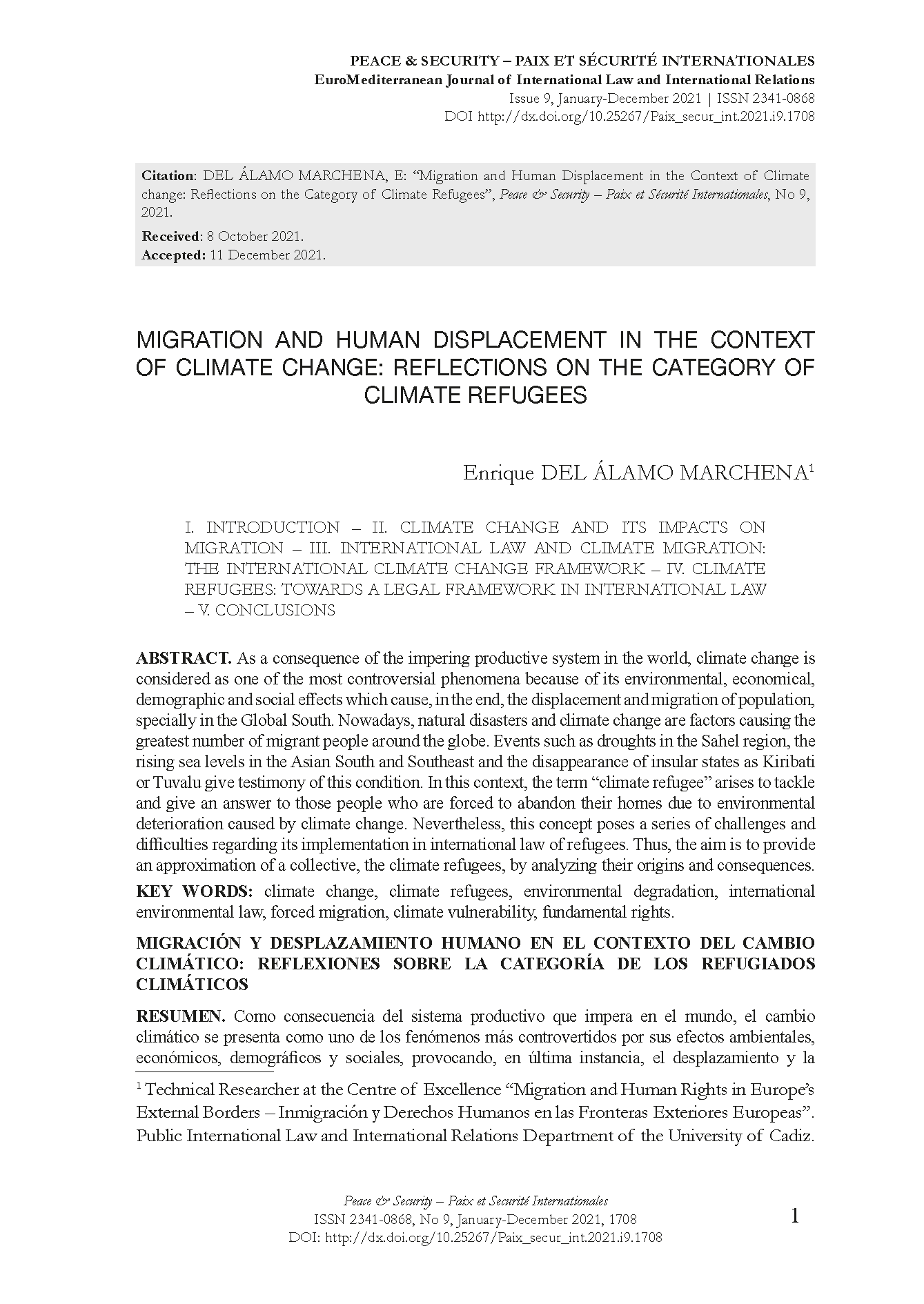Migration and Human Displacement in the Context of Climate change: Reflections on the Category of Climate Refugees
Résumé
MIGRATION ET DÉPLACEMENT HUMAIN DANS LE CONTEXTE DU CHANGEMENT CLIMATIQUE: RÉFLEXIONS SUR LA CATÉGORIE DES RÉFUGIÉS CLIMATIQUES
Conséquence de la mise en péril du système productif mondial, le changement climatique est considéré comme l’un des phénomènes les plus controversés en raison de ses effets environnementaux, économiques, démographiques et sociaux qui entraînent, en fin de compte, le déplacement et la migration des populations, en particulier dans le Sud. De nos jours, les catastrophes naturelles et le changement climatique sont les facteurs qui provoquent le plus grand nombre de migrations dans le monde. Des événements tels que les sécheresses dans la région du Sahel, l’élévation du niveau des mers dans le Sud et le Sud-Est de l’Asie et la disparition d’États insulaires comme Kiribati ou Tuvalu témoignent de cette situation. Dans ce contexte, le terme “réfugié climatique” apparaît pour aborder et donner une réponse à ces personnes qui sont forcées d’abandonner leurs maisons en raison de la détérioration environnementale causée par le changement climatique. Néanmoins, ce concept pose une série de défis et de difficultés quant à sa mise en œuvre dans le droit international des réfugiés. Ainsi, nous avons l’intention de donner une approximation d’un collectif, les réfugiés climatiques, en analysant leurs origines et leurs conséquences.
Mots-clés
Téléchargements
Comment citer
Licence

Cette œuvre est sous licence Creative Commons Attribution - Pas d'Utilisation Commerciale 4.0 International.
Copyright
Es condición para la publicación que el autor o autores ceda(n) a la Revista, en exclusiva, los derechos de reproducción. Paix et Sécurité Internationales es una revista que proporciona un acceso abierto inmediato a su contenido totalmente gratuito para lectores como para los investigadores que pretendan publicar en ella, ya que no se realizan cobros por concepto de envío, procesamiento ni publicación. Los usuarios podrán leer, descargar, copiar, distribuir, imprimir, buscar o enlazar el texto completo de los artículos publicados, o utilizarlos para cualquier otro propósito, dentro de la legalidad vigente. Y podrán hacerlo sin coste alguno, y sin necesitad de solicitar permiso al editor a al autor. Todo ello de acuerdo con la definición de acceso abierto de la Iniciativa Acceso Abierto de Budapest.
Références
CAMPINS ERITJA, M. “De Kioto a París: ¿Evolución o Involución de las Negociaciones Internacionales sobre el Cambio Climático?”, Instituto Español de Estudios Estratégicos, 15, 2015.
CELIS, R., & SEPÚLVEDA, C. Contra el despojo. Capitalismo, degradación ambiental y desplazamiento forzado. Análisis de los casos de Colombia y Ecuador. (1ª ed.). Bilbao: CEAR, 2012.
EL-HINNAWI, E. Environmental Refugees, United Nations Environment Programme, Nairobi, 1985.
ESPÓSITO, C., & TORRES, A. “Cambio climático y derechos humanos: el desafío de los “nuevos refugiados”, Revista de Derecho Ambiental de la Universidad de Palermo, 1, 2012.
GOODWIN-GILL, G and MCADAM, J. Climate change, disasters and displacement, Geneva, UNHCR, 2017.
HARARI, M., & LA FERRARA, E. “Conflict, Climate, and Cells: A Disaggregated Analysis”, The Review of Economic and Statistics, 100(4), 2018.
HOSSEIN, A., & ELSADING, E. Climate Refugees: The Climate Crisis and Rights Denied. Berkeley, CA: Othering & Belonging Institute, University of California Berkeley, 2019.
ISLAM, M. M., SALLU, S., HUBACEK, K., & PAAVOLA, J. “Migrating to tackle Climate Variability and Change? Insights from Coastal fishing Communities in Bangladesh”, Climatic Change, 124(4), 2014.
KÄLIN W., & SCHREPFER, N. “Protecting People Crossing Borders in the Context of Climate Change. Normative Gaps and Possible Approaches”, Legal and protection policy research series, nº 24, 2012.
KRALER A., KATSIAFICAS, C., & WAGNER, M. Climate Change and Migration. Legal and policy challenges and responses to environmentally induced migration. Brussels: Policy Department for Citizens Rights and Constitutional Affairs, European Parliament. 2020.
MCADAM, J. “Climate Change Displacement and International Law”, In Side Event to the High Commissioner’s Dialogue on Protection Challenges, 8 December, 2010.
MORRISSEY, J. “Rethinking the “Debate on Environmental Refugees”: from “Maximilists and Minimalists” to “Proponents and Critics”, Journal of Political Ecology, 19, 2012.
MYERS, N. “Environmental refugees in a globally warmed world”, BioScience 4 3(11), 1992.
MYERS, N. “Environmental refugees an emergent security issue”. 13th Economic Forum, 23-27 May. Prague, 2005.
NAVA ESCUDERO, C. “El Acuerdo de París: Predominio del soft law en el régimen climático”, Boletín Mexicano de Derecho Comparado, 147, 2016.
PAJARES, M. “Las dos fases de las migraciones climáticas”, Migraciones climáticas, 2019.
STELLINA, J., & AHMAD, N. “Climate Refugees under International Climate Law and International Refugee Law: Towards Addressing the Protection Gaps and Exploring the Legal Alternatives for Criminal Justice”, ISIL Year Book of International Humanitarian and Refugee Law, 14-15, 2015.
SUHRKE, A. “Environmental degradation and population flows”, Journal of International Affairs 47(2), 1994.
VERDÚ BAEZA, J. “A propósito de la cumbre climática de Marrakech: Cuando la solución empieza a ser parte del problema”, Revista electrónica de estudios internacionales (REEI). 33, 2017.
VLASSOPOULOS, C. “Defining Environmental Migration in the Climate Change era: Problem. Consequence or Solution?”, In T. Faist & J. Scheade (Eds.), Disentangling Migration and Climate Change, Springer, 2013, (1st ed.).
WALSHAM, M. Assessing the Evidence: Environment, Climate Change and Migration in Bangladesh. Dhaka: OIM, 2010.







